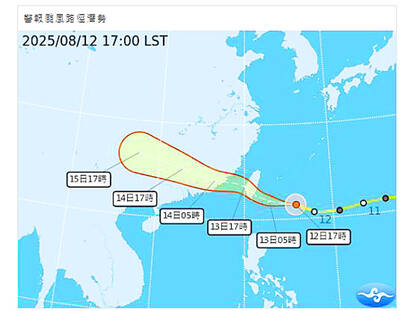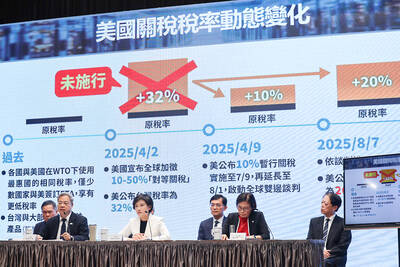Taipei Times: There were plans for Kimo.com to list on the NASDAQ market in the US. Any date yet? And what happens if there is a downturn on the NASDAQ?
David Lu: There is not enough time left in the first quarter. Now we plan to have a first-time strategic placement to find partners in Hong Kong and China that will help us with listing on the NASDAQ and expanding market share.
We will act after the strategic placement on the condition that the NASDAQ is performing well.
TT: What will your message to the Wall Street community be?
Lu: Taiwan's Internet market has developed faster compared to China and Hong Kong. We believe that our successful experience in Taiwan can be transferred to those areas that lag behind. In other words, its crucial to replicate our successful experience.
However, we do not intend to be a Greater China portal. Our approach is a "regional approach," which means that we see China, Hong Kong and Taiwan differently, because what matters is traffic.
Our target market is the general public, not small or specific groups. Even in China, we see central China as different from southern China.
TT: What would distinguish Kimo.com in China from existing Web portals, such as Chinadotcom and Yahoo.com?
Lu: In China, Hong Kong and Taiwan, we believe that Kimo.com offers the most comprehensive products with the strongest functions.
For example, Kimo has the largest number of Web-based e-mail users, and other well-established products include community and stock information. Another example would be that Chinadotcom is not a player in the field of providing search engine capabilities, and Kimo.com is very good at that.
Yahoo.com is our direct competitor. We have winning chances in China because if Yahoo.com can win, why haven't they beat us in Taiwan?
Therefore, our goal is to replicate our successful experiences in Taiwan in other Chinese communities very quickly.
We also believe that we understand Chinese cultural differences better. China's users in general are older and Hong Kong users can speak both English and Chinese, and the most important task for us is to build up on fundamentals and then add some local flavor.
For example, we will cooperate with local newspapers, the South China Morning Post and Apple Daily in Hong Kong, and the description of content in China will be expressed in simplified Chinese.
Of course, there is our experience in marketing in Taiwan and the ability to catch users' preferences and detect change.
In three years, our product offerings have moved from search engines to communities to personalization, and the next step will be variety.
Specifically, B2B and B2C e-commerce revenue this year is set to increase from zero to 30 percent. Intended products include Kimo auctions, a Kimo shopping mall and a personalized calendar.

GET TO SAFETY: Authorities were scrambling to evacuate nearly 700 people in Hualien County to prepare for overflow from a natural dam formed by a previous typhoon Typhoon Podul yesterday intensified and accelerated as it neared Taiwan, with the impact expected to be felt overnight, the Central Weather Administration (CWA) said, while the Directorate-General of Personnel Administration announced that schools and government offices in most areas of southern and eastern Taiwan would be closed today. The affected regions are Tainan, Kaohsiung and Chiayi City, and Yunlin, Chiayi, Pingtung, Hualien and Taitung counties, as well as the outlying Penghu County. As of 10pm last night, the storm was about 370km east-southeast of Taitung County, moving west-northwest at 27kph, CWA data showed. With a radius of 120km, Podul is carrying maximum sustained

Tropical Storm Podul strengthened into a typhoon at 8pm yesterday, the Central Weather Administration (CWA) said, with a sea warning to be issued late last night or early this morning. As of 8pm, the typhoon was 1,020km east of Oluanpi (鵝鑾鼻), Taiwan’s southernmost tip, moving west at 23kph. The storm carried maximum sustained winds of 119kph and gusts reaching 155kph, the CWA said. Based on the tropical storm’s trajectory, a land warning could be issued any time from midday today, it added. CWA forecaster Chang Chun-yao (張竣堯) said Podul is a fast-moving storm that is forecast to bring its heaviest rainfall and strongest

President William Lai (賴清德) yesterday criticized the nuclear energy referendum scheduled for Saturday next week, saying that holding the plebiscite before the government can conduct safety evaluations is a denial of the public’s right to make informed decisions. Lai, who is also the chairman of the Democratic Progressive Party (DPP), made the comments at the party’s Central Standing Committee meeting at its headquarters in Taipei. ‘NO’ “I will go to the ballot box on Saturday next week to cast a ‘no’ vote, as we all should do,” he said as he called on the public to reject the proposition to reactivate the decommissioned

TALKS CONTINUE: Although an agreement has not been reached with Washington, lowering the tariff from 32 percent to 20 percent is still progress, the vice premier said Taiwan would strive for a better US tariff rate in negotiations, with the goal being not just lowering the current 20-percent tariff rate, but also securing an exemption from tariff stacking, Vice Premier Cheng Li-chiun (鄭麗君) said yesterday. Cheng made the remarks at a news conference at the Executive Yuan explaining the new US tariffs and the government’s plans for supporting affected industries. US President Donald Trump on July 31 announced a new tariff rate of 20 percent on Taiwan’s exports to the US starting on Thursday last week, and the Office of Trade Negotiations on Friday confirmed that it